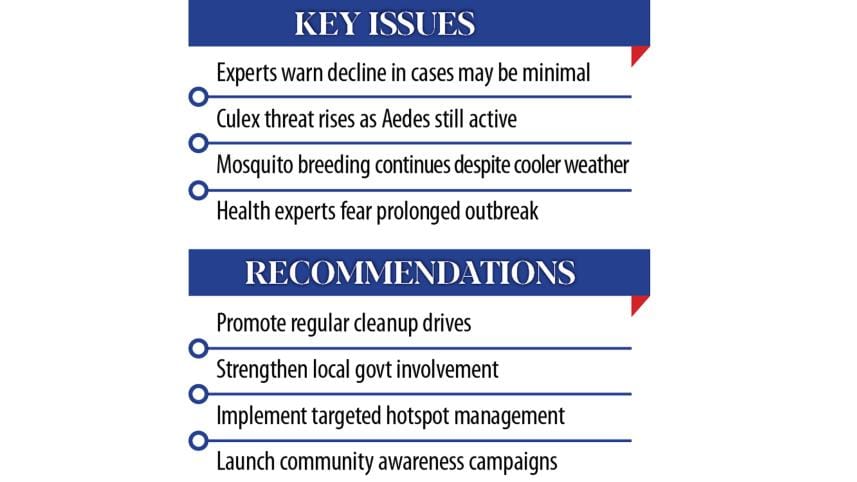Oct logs highest dengue toll of year

With the continuous rise in dengue-related deaths and infections, the country recorded 80 deaths and 22,520 cases in October alone -- the highest in any month this year -- highlighting an alarming trend.
According to experts, both dengue cases and deaths may show a slight downward trend from November as temperatures begin to drop. However, the decline is expected to be minimal.

Data from the Directorate General of Health Services shows that in October 2024, there were 134 dengue-related deaths and 30,879 cases, compared to 173 deaths and 29,652 cases in November.
The DGHS further reported that a total of 278 dengue patients had died and 69,862 were hospitalised this year, as of yesterday morning.
Entomologist GM Saifur Rahman said a slight downward trend is currently being observed.
"Naturally, this rate is expected to decrease further, as the cyclone and adverse weather conditions that were anticipated have now passed. In this situation, the current condition is likely to remain stable throughout this month, providing a clearer picture of the overall situation," he said.
However, Rahman cautioned that while numbers are expected to decline gradually, dengue will not disappear entirely. "Only the number of patients will slowly start to decrease," he added.
He also pointed out that the Culex mosquito population is on the rise and requires immediate attention. "Authorities must focus not only on dengue but also on the growing Culex mosquito population," he warned.
Rahman explained that the Culex population could become more serious by January or February, urging immediate preventive measures.
"Containers that previously held water but have now dried up may still contain mosquito eggs. These containers must be collected and properly disposed of without delay. Additionally, all active breeding sites should be identified and destroyed," he suggested.
Rahman emphasised that authorities now have a window of opportunity to take effective action over the next few months. "If measures are taken promptly, the early surge of dengue cases that typically appears in March or April after the first rains can be delayed," he added.
Entomologist of Jahangirnagar University Prof Kabirul Bashar also believes that while dengue cases may slightly decrease in November compared to October, the reduction will not be significant.
He attributed this to three main factors -- climate change and delayed rainfall, inefficiency of city corporations, and continued circulation of the virus.
Bashar said the epidemic can only be reduced through natural control or human intervention. "If nature suppresses the mosquito population, transmission will decline. Otherwise, it must be managed through human efforts, which city corporations are currently struggling to do effectively," he said.
Bashar emphasised the need to treat dengue as a local government issue, involving wards, upazila councils and district councils, rather than focusing solely on city corporations.
He outlined three key strategies for the next phase of dengue control -- breeding source management, hotspot management, and community engagement.
"Focusing on these three key areas will be essential for the next phase of dengue control efforts," Bashar said.




 For all latest news, follow The Daily Star's Google News channel.
For all latest news, follow The Daily Star's Google News channel.
Comments